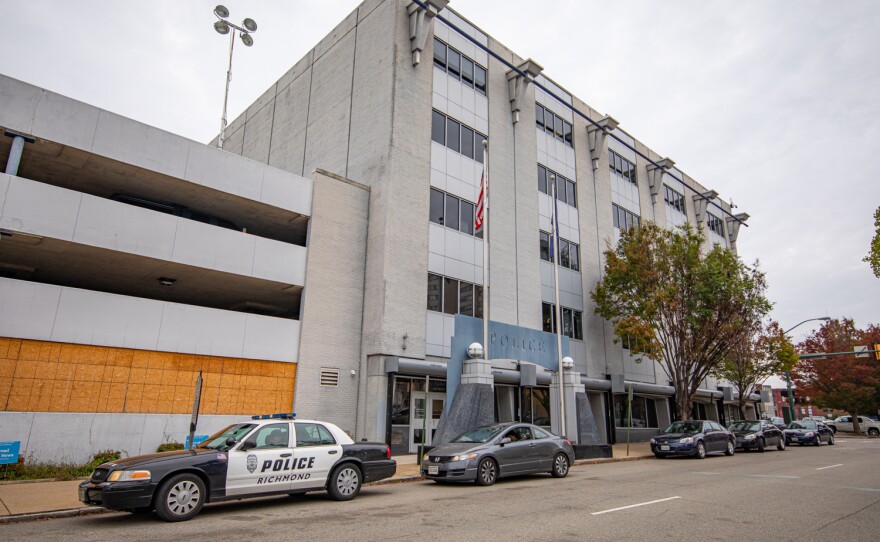Proponents of new police oversight legislation are pushing City Council to quickly approve a Richmond civilian review board amid criticism the panel is designed ineffectively.
City Council will consider amendments to the legislation at its Oct. 10 meeting but could pass the legislation in its original form if those amendments fail.
“Remember, this is two years running. We suggested a CRB back in June 2020. And now we're here in 2022, and we have not been able to get it across the finish line,” said Mayor Levar Stoney at a public event this week. “Now, we have a proposal that actually does that.”
As drafted, a new eight-member civilian review board would have more of an advisory role, rather than a powerful regulatory one. The legislation would not grant the board the ability to review budgets or issue discipline, new powers afforded to such bodies by state law.
Richmond Police Chief Gerald Smith retains much of the control over investigations into police conduct and the discipline of officers.
The Richmond Transparency and Accountability Project, a group seeking an end to mass incarceration through police reform, wrote in comment to City Council that the CRB would have “the fewest powers of any CRB in the state of Virginia.”
“If something is set up that's not effective [and] where people's problems with the police still aren't addressed, then that's just going to further erode community trust in the process, and in the police, and in the city generally,” said Eli Coston, of RTAP, who also served as a former co-chairperson of the CRB task force, which made the first recommendations to the city on the composition and powers of the oversight body.
In a press release, members of the Richmond City Democratic Committee also said the ordinance did not go far enough to be meaningful, though Stoney said the legislation fit Richmond’s “unique circumstances.”
“We believe that we should be able to appreciate our police officers, but also we believe in accountability as well. And that's exactly what this proposal does,” the mayor said. “I recognize that we're never going to be able to achieve 100% consensus on everything we do. However, if we can get at the table and agree on major values, and that's appreciation of our police officers, but also accountability, then I think that creates progress in itself.”
Richmond’s original CRB proposal had stagnated in city council since being introduced by Stoney in March. The mayor withdrew that legislation in July.
A Stoney spokesperson said the proposal was withdrawn to introduce a new version after councilmembers wanted to collaborate on changes to the legislation. Stoney’s chief of staff told council that Deputy Chief Victoria Pearson, who oversees the Richmond Police Department’s Office of Professional Accountability, also played a role in drafting the current legislation.
That legislation was introduced in September, and while making significant changes to membership, it would keep the discipline of personnel within the police department. The CRB would be an independent body, but decisions on certain incidents — like police shootings or deaths and injuries in custody — would be referred to it by the department. And complaints from the public would first be handled by RPD. Disciplinary decisions would be issued by the department and only then reviewed by the CRB, which could then make recommendations to the chief of police.
Councilmember Ann-Frances Lambert called concerns about the board’s advisory role in reviewing discipline, rather than issuing it, “legitimate.”
But Lambert, who represents the city’s Northside 3rd District and is a co-patron of the legislation, said it might be “too late” for those concerns to be raised.
“I'm wanting to just make sure we talk it out and make sure it's all addressed as we move forward,” she said while discussing critiques of the current legislation in an interview.
Since 2013, RPD has received an average of 118 complaints a year, according to a report by William Pelfrey, a professor at Virginia Commonwealth University that the mayor’s office hired to make recommendations on the planned oversight body. The department’s most recent annual reports, which typically break down the outcomes of complaints, were not immediately made available to VPM News.
According to Pelfrey’s report, many of the complaints are “departmental,” meaning they are similar to workplace issues people face in other fields of employment. Citizen complaints generally center on encounters with officers.
The number of both departmental and citizen complaints declined between 2013 and 2020, and departmental complaints now make up a larger share of complaints.
“RPD reports state that 5-10% of all complaints suggest possible criminal activity,” Pelfrey wrote in his report.
Under the current proposal, the chief of police would have to agree to the policies and procedures for the board’s operations. RTAP, the accountability group, said that threatens the board’s independence.
At a press briefing on crime statistics for the third quarter of 2022, Smith said he supported the creation of a CRB.
“I do believe that a civilian review board will be very beneficial in actually building trust in legitimacy within the police department,” he said.
City employees still have an appeals process — through the city circuit court — if they are subject to discipline.
Maisie Osteen, an attorney with the Legal Aid Justice Center who is assisting RTAP, said the CRB’s inability to review police budgets was an issue, too.
“The CRB should have an opportunity to look at that budget, to look where the money's being spent, to see where the taxpayer dollars of the citizens of Richmond are going,” she said.
RTAP’s written comment had other money concerns. It compared the new board’s budget to those in other localities, which were allocated more money per resident.




